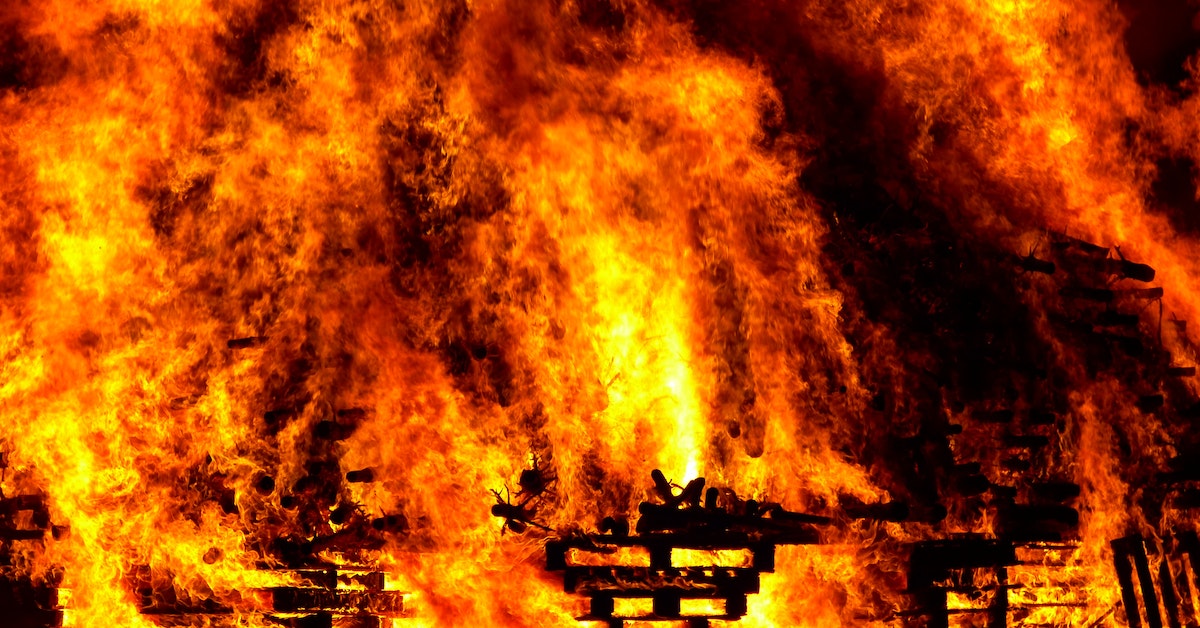What is Arson?
Arson is the criminal act of deliberately setting fire to property, including buildings and vehicles, typically to cause damage.
The severity of the crime often depends on the degree of harm caused, such as the extent of the property damage, whether anyone was harmed or killed, and whether the act was intended to commit insurance fraud.
Our criminal lawyers go into detail about what is arson in this article.
What Actions Might Constitute Arson?
In Australia, the laws around arson may vary slightly between different states and territories. Still, it generally involves the intentional or reckless setting of a fire intending to cause property damage.
Offences related to it in Australia include:
- Damaging property by fire or explosion: This is the most direct form, where someone intentionally or recklessly sets fire to or causes an explosion that damages property. This can apply to any property, not just buildings.
- Endangering life: If starting a fire puts other people’s lives at risk, this can be an additional serious offence.
- Bushfire arson: In Australia, deliberately starting a bushfire (wildfire) is a grave offence due to the potential for massive environmental damage and loss of life.
- Insurance fraud: If someone sets fire to their property intending to make a fraudulent insurance claim, this can also be prosecuted as arson.
- Conspiracy or aiding and abetting arson: If someone assists another person in committing arson or conspires with others to commit arson, they can also be charged with a crime.
Need a Lawyer?
What Must the Police Prove in Arson Cases?
In arson cases in Australia, like in many other jurisdictions, the police and prosecutors must generally prove the following elements:
The act: The suspect intentionally or recklessly started a fire. This might involve presenting evidence such as surveillance footage, witness testimony, or physical evidence like accelerants, matches, or other fire-starting materials that link the suspect to the crime scene.
Intent: The suspect intended to cause the fire or was recklessly indifferent to the consequences. This could be proven through evidence such as a confession, evidence of planning or preparation, or a motive such as financial gain (for example, in an insurance fraud case).
Damage: The fire caused property damage. This could be proven through photographs, video, or expert testimony about the extent and nature of the damage.
For more serious charges, such as arson causing death or endangering life, the prosecutors must prove that the suspect’s actions led to the endangerment or loss of life. This could involve medical testimony, witness accounts, or other relevant evidence.
Investigating and proving arson can be a complex task, often involving specialised fire investigators and forensic scientists to analyse the evidence and determine the cause and origin of the fire.
They might look for signs of accelerants, analyse burn patterns, and use other techniques to gather evidence that a fire was intentionally set.
[rcblock id=”3698″]
What are the Motives Behind Arson?
People may commit arson for a variety of reasons. Here are some of the most common motives:
- Financial Gain: Some individuals commit arson to collect insurance money. They might set fire to their property or hire someone else to do it. This type of arson is often considered insurance fraud.
- Vandalism or Rebellion: Particularly among younger individuals, fires may be set as a form of rebellion, mischief, or vandalism.
- Crime Concealment: Fires may be started to destroy evidence of another crime, such as burglary or murder.
- Revenge or Jealousy: Arson can be a form of revenge against someone who has wronged the arsonist. For example, an individual might set fire to the home, car, or business of someone they feel has wronged them.
- Excitement or Thrill-seeking: Some arsonists set fires simply for the thrill or the excitement of creating chaos and destruction or to see the response of emergency services.
- Mental Health Issues or Pathological Reasons: Some individuals with certain psychological disorders may be driven to set fires, either due to compulsions, as a cry for help, or as a means of expressing or coping with their emotional state.
- Political or Social Protest: Arson has been used in political protest or civil unrest, where individuals or groups set fires to make a statement or draw attention to their cause.
- Terrorism: Arson can be used as a weapon of terror to cause fear, disruption, and economic damage.
What Are The Possible Defences of Arson?
Defending against an arson charge in Australia, as in many jurisdictions, would largely depend on the circumstances of the case, the evidence at hand, and local laws and regulations.
Here are a few possible defences that could be used in an arson case:
Lack of Intent: The prosecution must prove that the defendant intended to start the fire. It could be a valid defence if the defence can show that the fire was started accidentally or without any intent to cause harm or damage.
Alibi or Mistaken Identity: This can be a defence if the defendant can provide evidence that they were not at the crime scene when the fire was started or that they have been mistaken for the real culprit.
Duress or Necessity: If the defendant can demonstrate that they were forced to start the fire due to threats or immediate danger to themselves or another person (duress) or in a situation where committing the crime was the lesser of two evils (necessity), this could potentially be a defence.
Insanity or Mental Impairment: If a defendant can prove that they had a mental disorder at the time of the act and that it prevented them from understanding the nature and quality of their actions, they could use this as a defence.
Faulty or Insufficient Evidence: If the evidence collected is insufficient to prove beyond reasonable doubt that the defendant committed the act, or if the evidence was collected or mishandled, the defence can argue to have the charges dismissed or reduced.
No Property Damage: In some cases, if the fire did not actually damage property (or the damage was minimal), this might be used as part of a defence strategy.
What is a Bushfire Arson?
Bushfire arson is a grave offence in Australia due to the potential for enormous environmental damage, destruction of homes and property, harm to wildlife, and risk to human life.
This kind of arson can lead to widespread devastation, as seen in the 2019-2020 Australian bushfire season, which led to significant loss of life, property, and wildlife.
Deliberately lighting a bushfire is criminal, and individuals guilty of this can face severe penalties. The penalties vary by state but can include many years in prison.
In some states, if a person is found guilty of intentionally causing a bushfire and thereby endangering life, they can face up to 25 years in prison.
The investigation of bushfire arson can involve analysis of fire patterns, determination of the fire’s point of origin, detecting accelerants, and other forensic techniques.
Authorities also often rely on information or reports from the public to help identify potential arsonists.
Prevention and early detection are critical strategies in managing the risk of bushfires, whether caused by arson or other factors.
This involves public education about fire safety, strict fire bans in periods of high risk, and vigilance from the community in reporting suspicious behaviours.
What are the Penalties for Arson in Australia?
Below is a general outline of potential penalties for arson-related offences in Australia, according to various states’ laws:
| State/Territory | Legislation Referenced | Offence | Maximum Penalty |
| New South Wales | Crimes Act 1900, Section 195 | Damaging property by fire or explosion | 14 years imprisonment |
| New South Wales | Crimes Act 1900, Section 198 | Causing a bushfire | 21 years imprisonment |
| New South Wales | Crimes Act 1900, Section 195(2) | Damaging property with the intent to commit insurance fraud | 10 years imprisonment |
| Victoria | Crimes Act 1958, Section 197A | Intentionally or recklessly causing a bushfire | 15 years imprisonment |
| Victoria | Crimes Act 1958, Section 197B | Causing a bushfire that endangers life | 25 years imprisonment |
| Victoria | Crimes Act 1958, Section 197C | Damaging property by the fire with the intent to endanger life | 15 years imprisonment |
| Queensland | Criminal Code 1899, Section 461 | Arson | Life imprisonment |
| Queensland | Criminal Code 1899, Section 469A | Setting fire to crops and growing plants | 14 years imprisonment |
| Queensland | Criminal Code 1899, Section 433 | Setting fire for purposes of fraud | 14 years imprisonment |
Can I Be Charged with Arson If It Was an Accident?
The critical element in an arson charge is typically the intent to start a fire and cause damage. This would often not be considered arson if a fire was initiated by accident without intent to cause harm.
However, this doesn’t mean you would necessarily avoid all legal responsibility. Even if a fire is started unintentionally, if it’s due to reckless behaviour or a failure to observe safety laws or regulations, you could still face legal consequences.
For example, if a fire was started because you left a campfire unattended or discarded a lit cigarette in a dangerous area, you could be held responsible for any damage caused, even if you didn’t intend to start a fire.
Facing Arson Charges in Australia?
Your freedom and reputation may be under fire, but Walker Pender Group is here to douse the flames of an arson charge.
Our experienced criminal lawyers are well-versed in Australia’s intricate legal landscape, and we’re prepared to defend your rights vigorously.
Don’t let the uncertainty of your situation consume you. Let us chart a strategic, robust defence path on your behalf. Contact us today for a consultation – you don’t have to face this blaze alone.



